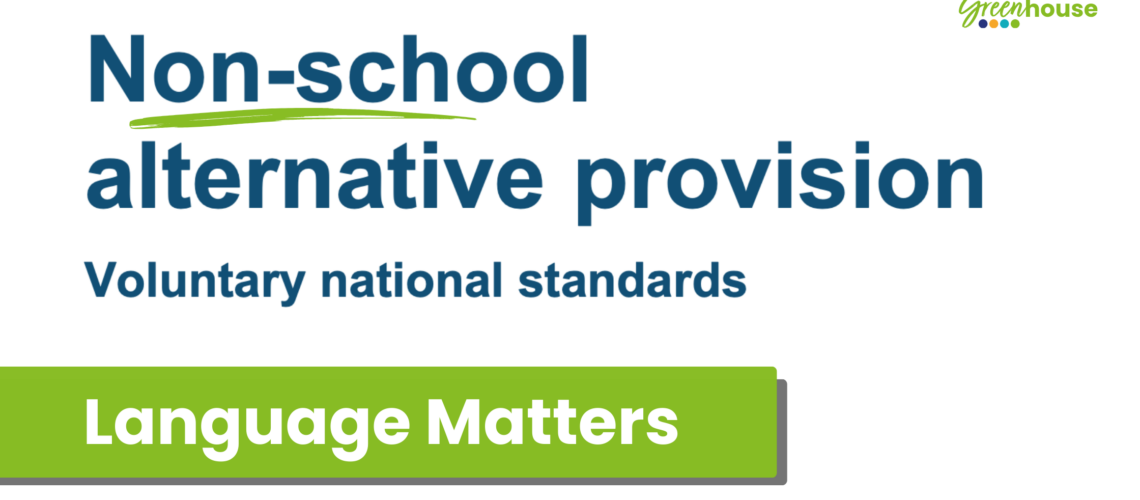In the ever-evolving landscape of education, language matters. The recent official shift from “Unregistered Alternative Provision” to “Non-School Alternative Provision” represents more than just a change in terminology, it marks a crucial step toward reducing stigma and better understanding the vital role these provisions play in supporting our most vulnerable young people.

Breaking Down the Barriers of Language
For too long, the term “unregistered” has carried unnecessary weight and negative connotations. Parents, local authorities and even some professionals have viewed “unregistered” provision with suspicion, despite many of these settings providing exactly what certain young people need to thrive. The reality is that the “unregistered” classification primarily comes down to one key factor: the inability to provide the statutory 18-25 hours of education per week required for Ofsted and Estyn registration for mainstream schools and is expected for independent schools.
But here’s what’s crucial to understand: while those hours matter, what matters more is meeting young people where they are right now and creating an appropriate pathway forward based around their needs.
Meeting Young People Where They Are
As a alternative education provider for Children Looked After (CLA), we see the statistics are forever growing with children needing different forms of education, and that is a positive sign in many ways, as we are recognising the fact not everyone learns the same and may need different levels of support to succeed and develop. However, we still witness the misinterpretation of understanding what an unregistered (now non-school) AP is and how it can be a stepping stone within the larger plan to help re-engage and then reintegrate students to a more full time setting. The more these needs are recognised and acknowledged and then acted upon in the correct environment with clear education plans, the better outcomes we can expect for these young people and the better use of local authority money.
Many of the children and young people who benefit from non-school alternative provision face complex challenges. They may be dealing with trauma, have been out of education for extended periods, or simply cannot function in a traditional school environment due to their individual circumstances. For these young people, being thrust into a potential full 25-hour school week isn’t just inappropriate, it can be counterproductive and ultimately harmful. Independent Schools do amazing work with these young people, but many are over subscribed or cannot meet need in some cases due to still having to keep attendance levels at certain standard as an Ofsted/estyn requirement.
This is where non-school alternative provision truly fills a critical gap. These settings specialise in engagement and progression over attendance, helping young people gradually build their confidence, skills and readiness to eventually transition into Ofsted or Estyn-registered settings when appropriate.
The Importance of Structure and Accountability
Like any educational setting, quality matters enormously in non-school alternative provision. The most effective provisions, including those we’re proud to offer, establish clear boundaries and expectations from the outset. We believe in being transparent with local authorities, parents, and most importantly, our students about:
- How we can be flexible while remaining progressive
- What families, care providers and local authorities should expect from us
- What we expect from our students in return
- Clear outcome goals and regular plan updates
- Whether the focus is re-engagement, qualification achievement, or school reintegration
Creating a safe space for Young People to access the right education

The uncomfortable truth is that forcing vulnerable young people into traditional school settings simply to meet compliance requirements often leads to failure, the very outcome we’re all working to prevent. When local authorities insist that a child “must” have 25 hours of education per week, regardless of their individual needs and circumstances, we risk causing more harm than good.
Forward-thinking local authorities already recognise this. They understand that Education Other Than At School (EOTAS) provision serves a vital purpose and that quality, not just quantity, should be the measure of success.
The need for non-school alternative provision isn’t something to hide or feel ashamed about, it’s something to celebrate. It represents our growing understanding that every young person is different and requires different levels of support. This diversity of need should be clearly recognised and valued, not stigmatised.
The path forward
As we embrace this new terminology, it’s essential that each non-school alternative provision maintains high standards of accountability. In the new Non-School Alternative Provision Voluntary National Standards there are four key themes covered:
- Safeguarding and the welfare of children
- Health and safety
- Admissions, guidance and support
- Quality of education
The providers who demonstrate these standards and follow through with measurable progress are the ones leading the way in this essential area of education.
The shift to “Non-School Alternative Provision” is more than semantic, it’s a recognition of the vital role these settings play in our education ecosystem. By removing the stigma associated with “unregistered” provision, we open the door to better understanding, increased support and ultimately, better outcomes for the young people who need these services most.
At The Greenhouse, we’re committed to being part of this positive change, providing the flexible, progressive support that helps young people find their way back to education and toward a brighter future. Because sometimes, the most important step forward is meeting someone exactly where they are today. It’s vital that excellent education providers, whether Alternative Provision, Special Independent or Mainstream Schools, and Local Authorities work together on understanding the need for each one, to better help the individual and develop that progressive pathway.
We have been working hard to ensure our 3 key goals (rengagement, reintegrations and qualifications) for students can be delivered through a progressive pathway offering trauma-informed tutoring to our alternative provision, and with plans next year, our Independent School. This pathway demonstrates how each student can be met where they are at and provide education according to their needs and a plan that will deliver at each stage in their development and looking towards the futre.
